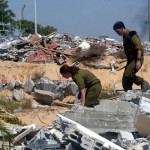
Two weeks ago, Turkey and Syria held, for the first time in history, joint military drills. The exercises were a clear sign of the increasingly close ties between the two states as they co-operate on wider agendas. At the same time, they raise the question: what happens to other relationship, notably the long-standing ties between Ankara and Tel Aviv?
When Turkey felt isolated by its neighbors in 1995, the first door it knocked on was Israel's. The Turks had one eye on recent manoeuvres by Greece: the Greco-Syrian military training agreement in 1995 followed a similar arrangement between Israel and Greece in December 1994. On the economic front, the volume of trade between Israel and Greece reached $350 million, double that of 1989. Meanwhile, Syria was causing problems with the border dispute over Hatay, arguments over water, and Hafez al Assad's support to the PKK, the Kurdish "terrorist" organization.
Turkey's nightmare was wider cooperation between Syria and Israel, meaning that Tel Aviv would be tied to long-standing rivals both in Damascus and in Athens. So Ankara countered with a full alignment with Israel. Military, economic and technological agreements were reached in 1996, and a trilateral operation in the Eastern Mediterranean by Israel, Turkey and the US was conducted in January 1998.
More than a decade later, it is Tel Aviv which is concerned about "isolation" as other countries establish alliances. Defense Minister Ehud Barak called the Turkish-Syrian exercise "a worrisome situation" and
the Israeli press featured the issue after the head of the Turkish military, Ilker Basbug said Turkey was not interested in Israel's reaction. The
Jerusalem Post tried to limit the exercise's significance, with the claim of Professor Efraim Inbar that he had spoken to Turkish army officers: "The Turkish military does not like Syria, and views it as a problematic state." The newspaper also highlighted tensions between the army and Turkey's ruling Justice and Development Party.
The Israeli criticisms are evidence that the fallout from the rhetorical war between Turkish Prime Minister Recep Tayyip Erdogan and Israel's leaders has not dissipated. The revenge for Erdogan's attack on Israel at the Davos summit is the wearing down of his Justice and Development Party. Thus the hostility to the Turkish-Syrian exercises is in part a message to Turkey's military: keep your Prime Minister under control.
As for the regional politics, the Israeli response is another signal that any peace will have to start with Israeli-Syrian talks rather than alignments beyond Tel Aviv. Yet the Israeli-Syrian discussions have been sidelined with the Netanyahu Government's focus on Iran, set against the US insistence on a two-state solution with Palestine.
So the Israeli media fills the political vacuum while trying to keep both Turkey and Syria off-balance. The question arises: is this also the aim of Prime Minister Netanyahu and his Foreign Minister, Avigdor Lieberman, or are they also trying to figure out how to reconcile Israel's relationship with its immediate crises with its wider but now suspect "alliances" in the region?
 Saturday, May 23, 2009 at 11:00
Saturday, May 23, 2009 at 11:00  On Thursday, the Israeli police destroyed an outpost of seven huts in the East Jerusalem, considered illegal under the Israeli law and built without government authorization. While the inhabitants of these settlements vowed to rebuild their houses (and some did), the Israeli officials are worried about the evacuations of larger settlements if there is a broad-based dismantlement plan in the future. About 500,000 Jewish settlers live in the West Bank .
On Thursday, the Israeli police destroyed an outpost of seven huts in the East Jerusalem, considered illegal under the Israeli law and built without government authorization. While the inhabitants of these settlements vowed to rebuild their houses (and some did), the Israeli officials are worried about the evacuations of larger settlements if there is a broad-based dismantlement plan in the future. About 500,000 Jewish settlers live in the West Bank .
 Two weeks ago, Turkey and Syria held, for the first time in history, joint military drills. The exercises were a clear sign of the increasingly close ties between the two states as they co-operate on wider agendas. At the same time, they raise the question: what happens to other relationship, notably the long-standing ties between Ankara and Tel Aviv?
Two weeks ago, Turkey and Syria held, for the first time in history, joint military drills. The exercises were a clear sign of the increasingly close ties between the two states as they co-operate on wider agendas. At the same time, they raise the question: what happens to other relationship, notably the long-standing ties between Ankara and Tel Aviv?